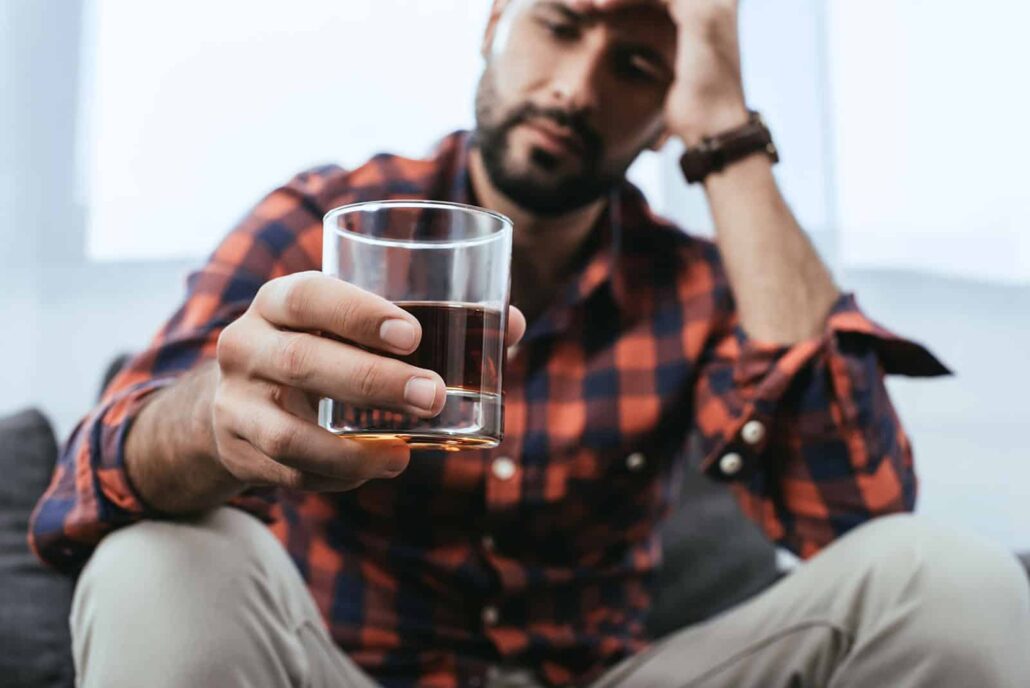It’s easy to overlook the subtle grip that alcohol has on us in today’s busy world. Many think of alcohol as a stress reliever or a social lubricant. Unfortunately, occasionally consuming alcohol can turn into a complex web of dependency that affects your physical, mental, and emotional well-being.
If you or any of your loved ones are having alcohol problems, it’s important to stop drinking and commit to an alcohol detox program. Fortunately, with the right plan and support, detoxing from alcohol doesn’t have to be hellish.

Table of Contents
Understanding Alcohol Dependency
Some people think of it as weak will, while others consider it a lack of self-discipline, but alcoholism is a serious chronic disease. It’s characterized by one’s inability to control or stop drinking despite the negative consequences of alcohol.
Alcoholism is a serious condition that alters the brain’s neurotransmitters, making it hard for heavy drinkers to stop or control their drinking behavior.
What makes it even harder for alcoholics to stop drinking is the allure of alcohol that often masks its potential harm. Drinking can start as a form of recreation or as a coping mechanism, but it can swiftly transform into a formidable force controlling one’s actions and decisions.
Contrary to popular belief, you don’t have to drink to extreme levels to become alcohol dependent. But how can someone differentiate between moderate alcohol use and dependency?
Signs and Symptoms of Alcohol Dependency
Recognizing the signs and symptoms of alcohol dependency is a crucial step in your sobriety journey.
If you suspect you have an alcohol problem, you must seek help from a medical or mental health professional. Only these professionals can diagnose alcohol problems or alcohol use disorders.
How do they diagnose alcoholism, you ask?
They usually rely on criteria from the Diagnostic and Statistical Manual of Mental Disorders, Fifth Edition (DSM-5) to help them in diagnosis.
These criteria include the following signs and symptoms:
- Consuming alcohol in larger amounts or for longer periods than intended.
- Experiencing a strong desire or urge to consume alcohol.
- Persistent or repeated unsuccessful attempts to control or cut down alcohol use.
- Using alcohol in physically hazardous situations.
- Giving up important social, recreational, and occupational activities to use alcohol.
- Spending an excessive amount of time in activities related to using, obtaining, or recovering from alcohol.
- Continuing to consume alcohol despite repeated social and interpersonal problems exacerbated by the effects of alcohol.
- Experiencing tolerance manifested by the strong need for increased amounts of alcohol to achieve intoxication.
- Continues alcohol consumption regardless of the persistent physical and psychological problems caused by alcohol.
- Experiencing withdrawal symptoms when trying to stop alcohol consumption, including nausea, vomiting, tremors, and insomnia.
- Inability to fill roles obligation in work, home, or school because of recurrent alcohol use.
Individuals don’t necessarily need to meet all of these criteria to be diagnosed with alcohol use disorder. If an individual meets two or more of these pointers within 12 months, they’re diagnosed with AUD (alcohol use disorder).

The number of present criteria determines the severity of each case. So, for example, meeting two or three criteria indicates mild AUD. Four to five criteria signify moderate AUD. Meanwhile, meeting six or more symptoms indicates severe AUD.
This diagnostic approach isn’t only necessary to determine the presence of alcoholism. It’s also vital as it ensures a comprehensive understanding of the individual’s relationship with alcohol, which helps in establishing the appropriate intervention strategies.
Bear in mind that some individuals may be more prone to become alcohol dependent. But why?
Risk Factors for Developing Alcohol Dependence
Alcoholism is a complex web of various influences. As you already know, people abuse alcohol for endless reasons, from genetic predisposition to psychological factors.
What’s important is to identify the risk factors associated with heavy alcohol consumption because it helps in prevention and early intervention.
Here are some of the most common key contributors that elevate the risk of alcohol dependency:
- Genetic Predisposition: Individuals with a family history of alcoholism are at higher risk of developing alcohol addiction.
- Psychological Factors: People often opt for alcohol as a form of self-medication to alleviate symptoms of depression, anxiety, schizophrenia, or trauma.
- Early Onset of Drinking: People who start consuming alcohol at an early age are more prone to alcohol dependency than those who delay the onset of alcohol use.
- Social Factors: Never underestimate the effect of one’s social surroundings. Living in an environment where alcohol consumption is encouraged can easily contribute to alcohol misuse.
- Stressful Life Events: Experiencing significant stressful events such as loss, trauma, or major life changes can be a triggering factor for alcohol addiction.
- Consistent Drinking Over Time: Consuming too much alcohol regularly or binge drinking for extended periods can easily transform into alcohol use disorders.
The Need for Alcohol Detox
As individuals find themselves tangled in the complex web of alcohol dependence, the necessity of following a strategic and comprehensive intervention becomes apparent. The first crucial step in the sobriety journey is alcohol detox.
Alcohol detox isn’t just about the mere cessation of alcohol consumption. It’s a systemic and supervised process that aims to safely manage the physical and mental alcohol withdrawal symptoms.
Since alcohol is an extremely addictive substance, your body becomes used to the presence of alcohol when you drink too much on a regular basis.

When you stop drinking after chronic alcohol use, your body starts to readjust itself to function without the substance. This is the most difficult part: dealing with withdrawal symptoms. But thanks to alcohol detox, you can safely abrupt your alcohol use and learn to cope with the intense withdrawal symptoms.
Alcohol withdrawal symptoms can be unpredictable. That’s why many alcohol abusers are reluctant to take the first step to becoming sober because of what they hear about the intensity of withdrawal symptoms. But the truth is, withdrawal symptoms aren’t necessarily severe.
Some individuals experience harsh withdrawal symptoms, while others only go through minor undesirable effects. That’s when alcohol detox comes in handy. Since it’s done under professional medical guidance, treatment professionals teach individuals how to react and deal with withdrawal symptoms, either with coping mechanisms, medication, or a combination of both.
Health Risks of Abruptly Stopping Alcohol Use
As we mentioned, there are various alcohol withdrawal symptoms that range from mild nausea and vomiting to severe tremors and convulsions.
That’s why individuals suffering from alcoholism should always seek professional help to stop drinking. But what about quitting alcohol without an alcohol detox program?
Quitting alcohol “cold turkey” is all about stopping consuming alcohol altogether without seeking any professional help.
While this may sound like the easiest and fastest solution to alcohol dependence, it’s actually dangerous. Why?
A recent study shows that 12.8% of people with alcohol use disorder undergo at least one episode of convulsions or delirium tremens.
These are some of the worst symptoms of alcohol withdrawal that are characterized by tremors, seizures, high fever, hallucination, confusion, and agitation. Delirium tremens can even be fatal if paired with any of these symptoms.
Without professional medical help, dealing with these harsh withdrawal symptoms effectively is almost impossible.
But when someone experiences these intense symptoms in a treatment center or a rehab, they’ll get the required medical help to ensure they’re more comfortable dealing with these symptoms.
Professional medical help also becomes mandatory if these symptoms exacerbate and someone’s life becomes on the line.
The Alcohol Detox Process
As we mentioned earlier, alcohol detox programs don’t only help individuals get rid of their alcohol addiction. It’s a systemic approach designed to carefully manage the physical and physiological effects of withdrawal.

No matter which program you choose, all alcohol detox programs are supervised by healthcare professionals who provide the necessary support and medical interventions to navigate this complex journey.
Before starting an alcohol detox program, individuals undergo a thorough assessment and evaluation conducted by a team of healthcare professionals.
The assessment involves gathering information about the history of alcohol abuse, overall health, consumption patterns, reasons for abuse, and more. This step is crucial as it aids in crafting a tailored treatment plan for each individual based on his condition.
Here’s an example of how alcohol detox works:
Stage 1: Mild Withdrawal Symptoms
The first step of alcohol withdrawal begins after six to eight hours of the last drink. It involves a series of mild symptoms such as changes in behavior and mood, physical disturbances, and insomnia.
Here are the most common withdrawal symptoms during the first stage:
- Anxiety
- Tremors
- Convulsions
- Insomnia
- Hypertension
- Nausea and vomiting
- Cravings for alcohol
- Sweating
- Shakiness
- Hallucinations
Stage 2: Moderate Withdrawal Symptoms
Soon after the symptoms of the first stage subside, the second stage begins. This phase usually occurs within the first three days, and it’s marked by intense physical and psychological symptoms.
During this stage, individuals are more likely to experience the most severe withdrawal symptoms, such as Delirium Tremens.
Here are the common side effects often experienced during this phase:
- High blood pressure
- Seizures
- Disorientation
- Mood swings
- Brain fog
- Delirium Tremens
- Intense tremors
- Fatigue
- Nausea
Stage 3: Post Acute Withdrawal
After one week, the central nervous system starts to recover and function normally without alcohol. Some people still experience mild withdrawal symptoms during this stage, and it’s completely normal. However, most severe side effects are already gone at this point.
Many factors control the presence of withdrawal symptoms at this stage, such as the amount of alcohol consumed, duration of abuse, and historical patterns of alcohol abuse.

Types of Alcohol Detox Programs
Depending on the initial assessment results, healthcare professionals determine the right approach for each patient. The treatment plan should be unique for each patient, and that’s why alcohol detox programs come in different forms.
- Outpatient Alcohol Detox
Outpatient alcohol detox programs provide a flexible approach, allowing patients to receive detox services while living at home instead of staying in a rehab facility.
In these programs, patients follow a structured schedule for attending individual and group meetings at the rehab center.
This option is suitable for individuals who don’t have severe alcohol dependency and don’t require intensive medical care.
As part of this program, individuals are prescribed medications to take at home to deal with the withdrawal symptoms.
- Inpatient Alcohol Detox
As the name suggests, inpatient alcohol detox involves patients staying in a rehab facility for the duration of the detoxification process.
It’s the traditional approach to alcohol detox in which patients receive round-the-clock medical supervision and follow a tailored treatment plan, including daily routine, group therapy, counseling sessions, and psychological aid.
Once the intense withdrawal symptoms are over, patients are often transferred to an outpatient program to continue their recovery. This program is the best option for patients with moderate to severe levels of alcohol dependency.
- Partial-Hospitalization Program
Partial hospitalization programs offer a level of care that’s somewhat more intensive than outpatient treatment but provides more flexibility than inpatient programs.
In PHPs, patients stay at the rehab center during the day, where they receive treatment and supervision and return home afterward.
This program is suited for individuals with stable living environments and strong support networks. But after all, medical professionals make the final decision regarding the level of care a patient should receive
- Aftercare
Recovery from alcohol addiction is a lifelong endeavor, and it doesn’t stop with alcohol detox. Aftercare is a vital part of the journey towards a sober life.
It acts as a lifeline, providing ongoing support, resources, and ongoing support to individuals transitioning from the structured treatment environment back to everyday life.
There are different aftercare programs, but most of them include outpatient counseling, support groups, and education on relapse prevention techniques.
Note that some individuals may still be prescribed medications to stop alcohol cravings and block the positive feelings created by alcohol.
To Wrap Up
There you have it, an inside look at what alcohol detox is all about. It’s a pivotal step towards a sober life. While quitting alcohol is never easy, alcohol detox programs help individuals manage the physical and emotional challenges of alcohol withdrawal, illuminating the route to recovery.
Whether through an inpatient, outpatient, or partial hospitalization program, alcohol detox remains the most crucial step toward sobriety. If you or any of your loved ones need help with alcohol problems, don’t hesitate to seek professional help.
Drug & alcohol detox programs are not directly offered by Long Island Interventions. However, we do recognize that this type of addiction treatment is often necessary and vital to one’s long-term recovery from substance abuse. If you or a loved one require any services that we do not offer we would be glad to refer you to one of our trusted affiliate providers.

